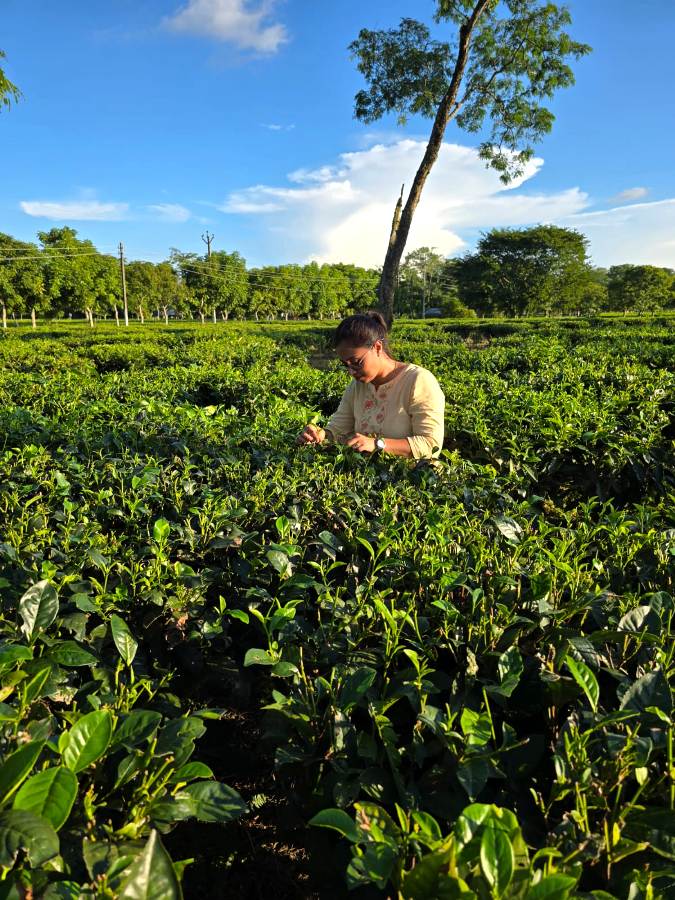A Nagaland University-led multi-institute research unveils hidden health potential of tea blossoms.
Share

DIMAPUR — A Nagaland University-led multi-institute research has unveiled the hidden health potential of tea blossoms that are often discarded as agricultural byproducts.
The study shows that these delicate flowers are abundant in potent bioactive compounds, positioning them as a natural source for health supplements and functional beverages, the university stated in an update.
While tea leaves dominate global research and consumption, blossoms remain largely overlooked.
“This study is the first systematic effort in Assam, one of the world’s largest tea-producing regions, to analyse the biochemical richness of tea blossoms from seven premium cultivars, rather than the traditional focus on the leaves,” it stated.
“Nutraceutical companies could harness tea blossom extracts to create natural energy boosters, relaxation aids, and skin-health products. Beyond consumer health, the research offers economic opportunities for smallholder tea farmers by opening new revenue streams through blossom collection and processing.”
According to the university, this approach also advances environmental sustainability, as utilising blossoms reduces agricultural waste and contributes to a circular bioeconomy.
With global demand rising for plant-based, eco-friendly health products, India has the chance to position itself as a leader in functional foods and supplements derived from tea blossoms, the update stated.
Dr. Sagarika Das, researcher from the Centre for Biotechnology and Bioinformatics at Dibrugarh University, fronted the groundbreaking research, collaborating with renowned tea biochemist Monoranjan Goswami from Tocklai Tea Research Institute in Jorhat, Assam, and Prof. Tanmoy Karak from the Department of Soil Science at the School of Agricultural Sciences, Nagaland University.
The transformative study also garnered contributions from prestigious institutions, including the University of California, ICAR-Indian Agricultural Statistics Research Institute in New Delhi, Horticulture and Soil and Water Conservation departments from NU, and the Department of Chemistry, Dibrugarh University, showcasing an extraordinary alliance in the pursuit of scientific excellence.
The research findings were published in the Food Research Journal, a reputable peer-reviewed publication, and were co-authored by Sagarika Das and team, which included Monoranjan Goswami, Ranjit Kumar Paul, and others.
Highlighting Nagaland University’s focus on translational research benefitting the local communities, the university’s Vice Chancellor Prof. Jagadish K Patnaik said, “This groundbreaking research highlights the potential of innovation originating from our region to effect significant global change. By tapping into the often-overlooked benefits of tea blossoms, our dedicated scientists are pioneering advancements in health and wellness that could revolutionise dietary supplements and natural remedies.”
The research team plans to advance into clinical trials, explore synergies with other nutraceuticals, and scale up for industrial applications across the food, pharmaceutical, and wellness sectors.
Elaborating on this research, Dr. Sagarika Das said, “Tea blossoms are known to be abundant in health-enhancing compounds, featuring notably higher concentrations of polyphenols, catechins, terpenoids, and L-theanine, while also having lower caffeine levels compared to traditional tea leaves.”
“The presence of L-theanine, particularly in combination with caffeine, is beneficial for promoting mental clarity, relaxation, and stress reduction. By repurposing tea blossoms, there is potential to minimise agricultural waste, increase rural incomes, and diversify the tea industry through the development of nutraceuticals, herbal teas, and dietary supplements.”
Further, Prof. Tanmoy Karak, Department of Soil Science, School of Agricultural Sciences, NU, added, “The study highlights the potential of tea blossoms as versatile ingredients that can be transformed into a variety of products, including herbal teas, infused oils, dietary supplements, and unique wellness formulations.”
The development of products derived from tea blossoms could stimulate economic growth in rural areas where tea is cultivated, supporting local farmers and creating job opportunities.
“Additionally, this innovation positions India to strengthen its global leadership in plant-based health products, showcasing the country’s rich biodiversity and commitment to sustainable health solutions,” Prof. Karak added.